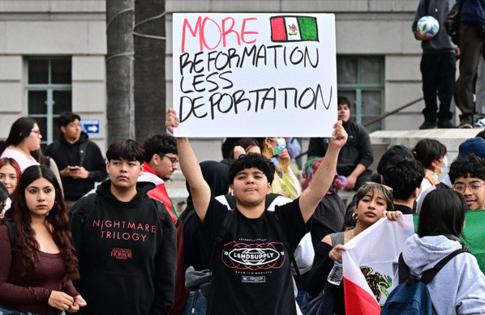Trump's immigration crackdown harms all
Published in Political News
President Donald Trump said he wanted to deport criminals, but his policies seem directed at other targets: the Sunday school teacher at my church, the mom I see at the park with her kids and even my seven-year-old daughter’s classmate.
The Trump administration has rescinded restrictions that previously limited Immigration and Customs Enforcement agents from conducting enforcement actions in “protected areas,” such as schools, churches and hospitals, in which administration claims criminals are hiding “to avoid arrest.”
This overturns a policy, in place since 2011, directing ICE agents to avoid “causing significant disruption to the normal operations of (a) sensitive location.” These guidelines were designed to protect access to essential services and prevent unnecessary fear in communities.
During Trump’s first term, ICE expanded its activities to include courthouses. But in 2021, the Biden administration issued further guidance to limit ICE activity at courthouses to ensure the safety of crime victims and “guarantee equal protection under the law.” The Trump administration has rolled back these protections.
As a mother, I think of the times I’ve needed to take one of my kids to urgent care or the emergency room. Are undocumented parents who do so now at risk of being permanently separated from their children?
I think of the immigrant families now terrified to send their children to school. Will ICE agents be waiting for them at the school gates? Or the families and individuals I worship with who lack permanent status. Must they now risk arrest just to gather and pray on Sunday?
Living in Florida, I’ve seen firsthand how increased immigration enforcement affects more than just noncitizens. In May 2023, Gov. Ron DeSantis signed into law SB 1718, which criminalized the transportation of undocumented individuals and required people seeking health care services to provide information about their immigration status.
The law sparked widespread concern within immigrant and noncitizen communities worried about their jobs, access to medical care and their children’s education. But it also had a negative impact on U.S. citizens and, for millions of people in mixed-status households, created fear over the threat of family separation.
These policies don’t just affect adults — they leave lasting scars on children who may witness ICE agents taking away a friend at school or see their parents’ fear at the park. How will these children view law enforcement in the future?
So much of our society is built on trust in institutions like churches, schools and hospitals. Research shows that when this trust erodes, the consequences ripple far beyond immigrant families. Policies that allow random arrests, inspections and surveillance in spaces that should feel safe threaten to undermine the very fabric of our communities. Must we all live in a heightened state of fear and anxiety?
Many of us who serve our communities feel a deep responsibility to care for both citizens and noncitizens alike. Doctors, teachers, pastors, social workers and countless others essential to our society now face the unsettling possibility of having to engage with ICE agents while simply doing their jobs. My husband, a pastor who leads our congregation, was stunned when he heard the news. “What am I supposed to do?” he asked, baffled and deeply concerned.
These policies are not just about immigration enforcement; they are about reshaping how we live and interact as a society. When fear and suspicion invade spaces that should feel safe — schools, churches, hospitals — they don’t just harm immigrant families. They erode the trust and connection that hold our communities together.
At what cost are we implementing these policies? Are we willing to accept the trauma of children witnessing their parents’ fear or the arrest of a friend at school? A society where neighbors turn on each other, where seeking medical care could mean family separation or where a pastor wonders if his church is still a sanctuary?
We must demand better. These policies don’t make us safer; they make us more divided. True safety comes from building trust, not tearing it apart. It means ensuring everyone — regardless of immigration status — can access education, health care and worship without fear. A community's strength lies in its compassion, not its cruelty.
____
Alexa Alvarado is a researcher and writer for Mormon Women for Ethical Government. She and her husband have two bilingual kids and enjoy serving their community in South Florida. This column was produced for Progressive Perspectives, a project of The Progressive magazine, and distributed by Tribune News Service.
_____
©2025 Tribune Content Agency, LLC.




























































Comments